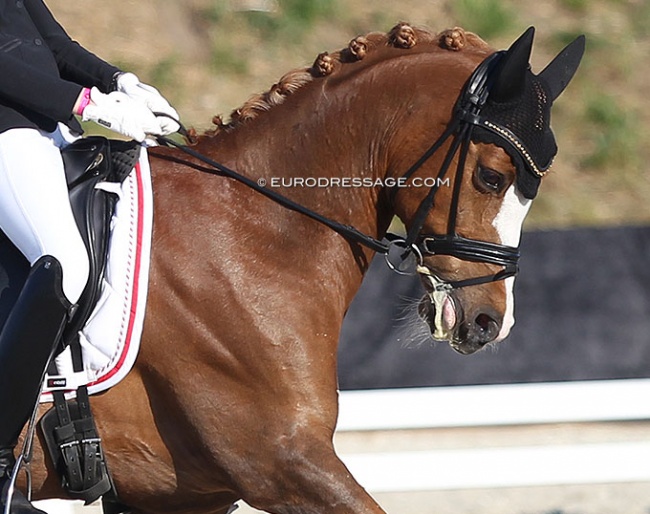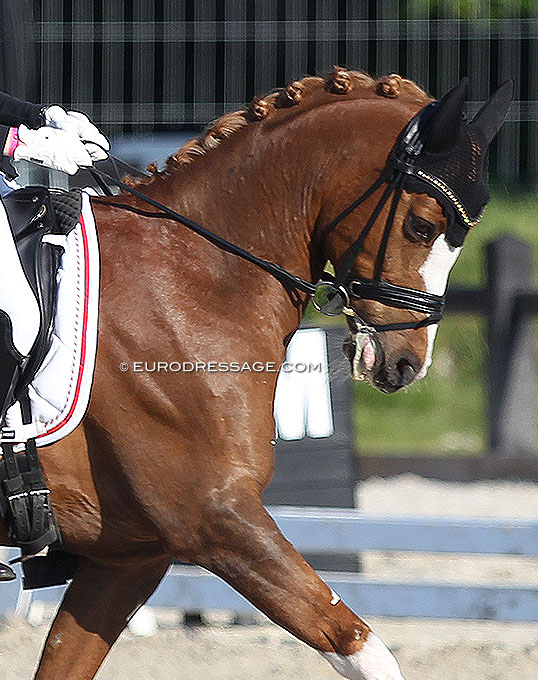
The Disciplinary committee of the Danish Equestrian Federation (DRF) has banned the internationally competed FEI dressage pony Nørlunds Vincente for life from participating in national competitions in Denmark.
Document Circulating
Anonymized documents of the committee's decision were circulated across international media the past month, but it was TV 2 who picked up the topic and first published the case. The date of the verdict as well as the names of the people and pony involved were removed from the document.
The Danish TV station TV2 also broadcast the infamous Operation X documentary on the alleged horse abuse at Helgstrand Dressage. It caused a shock wave across the industry and fuelled animal welfarists in their campaign for better horse keeping, riding, and training
Partial Amputation
TV2 posted an article on its website about the partial tongue amputation of pony Nørlunds Vincente, a 16-year old Danish Riding pony by Verdi x Chamberlain.
The article mentions that the pony "stuck out its tongue when ridden and it costs points at competitions. Therefore, a previous owner sent the pony to an equine hospital, where a veterinarian amputated the apex and partial blade of the tongue. This is the conclusion of the Danish Equestrian Federation after examining the pony and reading the vet's records and the purchase agreement."
Veterinarian Palle Brink carried out the operation. According to Ridehesten this happened at an equine clinic in Malmö, Sweden. Brink argued that the front section of the tongue was removed because of "infection and dead tissue in the tongue".
Hiding Training Issues
The disciplinary committee of the DRF, however, believes this was done to cover up the fact that the pony puts out its tongue when ridden, suggesting the tongue amputation came at the request of the owner to fix a training problem. The pony can now no longer put the tongue out as the apex barely reaches the inside of the front teeth.
The document reads, "The disciplinary committee finds, as the matter has been disclosed to us, that the intervention in the pony was not veterinary-professionally necessary for the sake of the pony, and that the intervention was done to camouflage pain and injuries and was targeted with a view to the pony's performance as a competition horse in dressage."

Sticking out tongue is often but not always a sign of discomfort because of an ill-fitting bit or hands that pull too hard in the mouth.
A Question of Ethics
The Danish Veterinary Association has now responded to the situation via word of Ginnie Holmes Hørning, head of the Working Group "Horse" of the Danish Veterinary Association.
She told TV2 that, "if a vet amputates part of a healthy tongue because the pony sticks its tongue out, then it is a very serious matter and also an illegal intervention."
TV 2 further posted that, "the ethics committee will now deal with the case, which may end with the vet being excluded from the association or sanctioned in some other way. While the case is ongoing, the association has removed the veterinarian from its list of specialists. According to the association, this is also done to avoid harassment by the vets on the list."
Vincente's international dressage career began in 2014 and his last CDI show was in May 2023. He competed internationally with four different riders. At national level he has competed in Denmark with nine riders. They are listed in a public database: Alexandra Sørensen, Sarah Elisabeth Bohlbro Johansen, Christine Marie Senger, Iben Olkjær Olsen, Anna Maarbjerg Piechnik, Camilla Juul Møller, Charlotte Iwang Søndergård, Sofie Aagaard Buur-Thomsen and Steffanie Victoria Horsted Dyrlund.
A New Issue? What about Neurectomies
Veterinarians assisting in covering up health and training issues for high performance sport horses are not uncommon.
While partial tongue amputations are rather rare, it is known in the industry that this has been been carried out to horses in barns of (Olympic) dressage riders before. More "popular" are neurectomies to deal with lameness issues in (dressage) horses. In the western riding and saddle seat world it is an unfortunate practice to denerve the tail (blocking). This is done to ensure that the horse's tail remains still during a performance.
It is not legal to compete in FEI events after a horse has undergone a neurectomy procedure. The FEI states: "Horses are not eligible to compete when a limb, or part of a limb, is hyposensitive or hypersensitive (both of which constitute “abnormal limb sensitivity”). Hypersensitive limbs have an excessive or abnormal reaction to palpation. Hyposensitive limbs include any alteration in sensitivity induced by a neurectomy or chemical desensitisation for as long as the alteration in sensitivity persists."
Neurectomies fall into a big grey area in the veterinary world as they can be performed at different sites, one of which causes no change in skin sensitivity, and there are also cases where the regrowth of nerves has resulted in regained sensitivity. Under the right circumstances denerved horses could allow to live a more comfortable and active life.
Roly Owers, chief executive of the World Horse Welfare organisation, told Horse & Hound, that "is clearly deeply unfortunate for the riders involved but is in the long-term interest of equine welfare and the sport. (...) It seems only right that there is full disclosure in the passport for horses that have undergone a neurectomy.”
When it comes to tongue amputation or tail de-nerving to hide training issues and tension for the sake of competitive sport , riders can make such requests to veterinarians, but it seems their ethical duty to reject them for the welfare of the horse.
Photos © Astrid Appels
Related Links
Danish Riding Instructor Association Expels Four Riders Based on Operation X
Danish Associations and Former Team Trainer React on Social Licence to Operate Following Operation X
Operation X Documentary Causes Cascade of Anger, Indignation, Disapproval
From the Horse’s Mouth... Actually the Horse’s Tongue